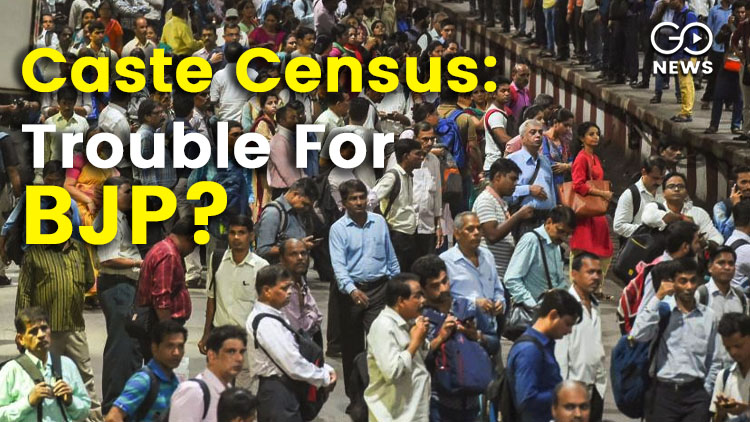Caste Enumeration In Census: Trouble For BJP?
Other than the Opposition leaders that have consistently been in support of caste enumeration in the upcoming census, even the alliance partners of the BJP and several of the party’s own MPs have been favouring the move. It is believed that there is significant pressure on the Modi government on this issue.

Why caste census is not being done? Socio economic caste census-2011’s numbers are not revealed to hide dominance of few sections in governance, society, jobs & opportunities; how Backward castes are lagging behind in education & upward mobility!https://t.co/ofCJLL8XKP
— Tejashwi Yadav (@yadavtejashwi) August 4, 2021
The caste system in Hinduism is nearly 2,000 years old. Brahmins/Pandits/Pujaris have traditionally been on the top of the pyramid while the Dalits have been historically relegated to an “untouchable” status along with indigenous Adivasis. These two have always occupied the bottom-most positions of the caste system. There are other castes all along the graded spectrum of the caste system that have not been properly enumerated. There is no comprehensive list of all listed castes by number or as a proportion of population.
Bihar CM Nitish Kumar along with close associate and Dalit leader Jeetan Ram Manjhi was also present in the delegation that sought to meet and explain the importance of caste enumeration in the next census. After the meeting, Kumar said that everyone was allowed to present their point of view to the Prime Minister and he heard them all closely. Nitish Kumar said that they demanded the earliest possible action on this issue from the Prime Minister.
Caste census will help in formulating development plans effectively:CM Nitish Kumar after Bihar delegation meets PM Modi
— Press Trust of India (@PTI_News) August 23, 2021
Tejashwi Yadav said that it was only after the Mandal Commission that the thousands of castes in the country emerged into view. He said that if even animals and plant life is counted, then why is not the same carried out for human beings. He questioned why the caste enumeration had not been carried out until this point, and linked the caste census with evolving beneficial schemes and solutions for the people at large.
Other than the Opposition leaders that have consistently been in support of caste enumeration in the upcoming census, even the alliance partners of the BJP and several of the party’s own MPs have been favouring the move. It is believed that there is significant pressure on the Modi government on this issue. Representatives of ten political parties were part of the delegation that met the Prime Minister along with Bihar CM Nitish Kumar on this issue.
There is a section of ‘lower’ and ‘middle’ level castes that is estimated to be around 52% of the population. This section is known as ‘Other Backward Classes’ or OBCs. The Census in India, which is conducted every 10 years, enumerates the Scheduled Castes (SCs) and Scheduled Tribes (STs) but not the OBCs. On August 23, AIMIM chief Asaddudin Owaisi also voiced his support for caste enumeration in the Census with OBCs in mind:The momentum has picked up for this demand. Along with those that support the BJP, there are other political groups demanding the enumeration of OBC castes in the census and declaring the same as mandatory.Implementation of caste census is important for the betterment of people from backward sections. A caste census should be introduced. Modi ji has parliamentary power, he should make law. Sub-categorisation of OBCs is also important: AIMIM chief Asaduddin Owaisi pic.twitter.com/mMd7sqSKXp
— ANI (@ANI) August 23, 2021
Now, the question arises as to why the BJP seems intent on avoiding the cast enumeration in the census. Experts say that this is influenced by the upcoming Uttar Pradesh Assembly Elections in 2022, and the Modi government in the Centre is avoiding any issue that might cost the party in the polls, especially in the context of the recent drubbing that the BJP received in the West Bengal polls, along with losses borne in some other states.
It is known that caste is an important factor in elections at any level, all the way from Gram Panchayat to Parliamentary elections. Uttar Pradesh, in particular, is a state where issues of caste are very prominent. In such a scenario, counting castes can have a detrimental impact on vote shares, and the BJP has spent many years in power consolidating its voter base, and has been successful to a large extent as well. The caste enumeration poses a threat to the Hindutva strategy, which is used to implement its strategy of polarization.
Members of ‘lower caste’ communities hold that their identity is an aspect of life that they deal with and struggle against every day. It is only those with caste privilege that can overlook or leave the matters of caste “unseen”. Proponents of the enumeration move argue that it will reveal the precise proportion of OBCs in the population, and will also expose the miniscule proportions of the so-called ‘Upper castes’ that have historically had a stranglehold on political, economic, and bureaucratic power.
The British government had begun the Census in 1872, and various castes were enumerated in it until 1931. However, at this time, ‘OBC’ had not been evolved as a constitutional criterion and was thus not enumerated. In 1941, the census had counted along caste lines again but the data had not been published.
After this, the country gained Independence in 1947. In 1951, under independent India’s first Census, only SCs and STs were enumerated. The rest of the caste groups were lumped in as ‘General’.
Latest Videos
















